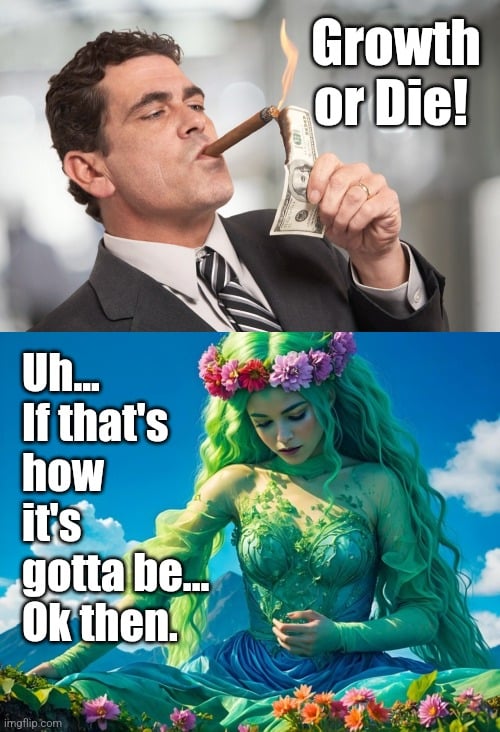this post was submitted on 13 Aug 2024
406 points (92.5% liked)
Memes
46115 readers
3756 users here now
Rules:
- Be civil and nice.
- Try not to excessively repost, as a rule of thumb, wait at least 2 months to do it if you have to.
founded 5 years ago
MODERATORS
you are viewing a single comment's thread
view the rest of the comments
view the rest of the comments

Believe me I'm doing all parts of things towards this, but I'm being realistic, I'm just 1 of 8 billion people... And Capitalism as much as I would like it to be different seems to be a rather stable system (destabilising all sorts of other things, don't get me wrong). I expect other things to collapse first (and foremost ecological systems).
In what way? Disparity rises and Imperialism gets worse until it eats itself alive. Systems exist in motion, and Capitalism is unsustainable.
It is, but I fear it will break apart much later than we hope it is. And likely violently, as worse ecosystems also mean less base on which capitalism can grow which in the past lead to conflicts. I mean the whole stuff gets already unstable when it isn't growing (and I don't mean capitalism as whole, more like everything connected to it)
It seems to be breaking pretty quickly.
Does it really? How do you come to that conclusion?
I mean climate change is certainly faster than most of the stubborn people, not grasping how much damage has already been done (as all of this comes in delayed and with feedback effects, which are already in motion).
Capitalism isn't lasting because people are "stubborn." It legitimately cannot sustain itself economically even without climate change. As disparity rises, and wages fail to keep up with productivity, rates of profit lower and exploitation increases.
I mean we're seeing it in the USA already don't we (as one of the more capitalistic examples)? Capitalism is still pretty stable, a lot of are mentally ill (otherwise I can't explain why someone like Trump is so popular). (And physically too). Opiate crisis. Richest country, yet the poorest are living in similar conditions as those in the poorer countries in Africa. I can name more examples of society falling apart, but yet capitalism still being strong (even in the democratic party). I mean I agree with your points (which are undermined by mine), yet that doesn't mean that capitalism is falling apart - and that means IMO that a major part of the people agree (and especially those with power, be it financial/political or military), that the system is is inherently flawed, and needs to be changed. But exactly that is something I'm not seeing anytime soon.
Then you need to read theory, this is an ableist and immaterial answer. Fascism is an attempt to set the clock back, so to speak, and takes the form of an alliance between the bourgeoisie and petite bourgeoisie along xenophobic and nationalist lines. It is a reactionary response to Capitalism's decay.
If you understand that the rate of profit trends towards zero, why would you think Capitalism is stable?
Interesting theory, need to think about that. Though I don't think Fascism and Capitalism are necessarily exclusive. (As example China, which is I'd say fascist and against the usual theory of "communism" quite state-capitalistic)
Because the trend is clearly not to zero currently, there's a lot of rich people (and the number is growing), profit is still growing, it's just that the gap between poor and rich is also growing. But Capitalism doesn't care about a lot of poor people. How that will be long-term is another story (as said ecosystems are the limiting factor).
China is not fascist. Read Ur-Fascism by Umberto Eco. America fits the commonly accepted fascist points far better than China currently does. China is certainly more liberal than it was under Mao, but it's not fascist.
The tendency for the Rate of Profit is falling, and will do so even when rich people grow and gross profits rise. Capitalism does care about poor people, wages are tied to subsistence + replacement (child raising), but it will pay no more until Capitalism is abolished. It is, in fact, this vector that drives decay and decline, wages cannot increase beyond it except in low supply labor fields. You may want to read Wage Labor and Capital